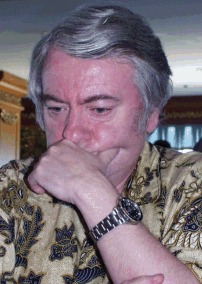07.06.2005
"Master makers". Mikhail Podgaets

Could one restate for chess a well-known football maxim: 'If you win, you are a good player, if you lose, you have a bad coach'?
I really come across such an attitude quite often. For example, when Karpov was playing stronger and won regularly, there was no such situation. Later, however, one starts looking for someone who is to blame... We can also remember an episode when Kasparov drove away his trainers’ team, when he had lost three games in a row.
Andrey Lukin mentioned that the higher is the level of a player, the more he wants to find other reasons of his defeat than his own performance, to lay the blame on his trainer. Do you agree with it?
I don’t think so. Such behaviour can be explained rather by the character and upbringing of a chessplayer than by a level of play.
Which qualities should a chess trainer possess?
A trainer needs to understand both chess and opening problems. Steadfastness, ability to make out his case. Sometimes there are things you have to prove, even going at it hammer and tongs – you need to be ready to face this.
Is it important for a trainer to maintain a shape by playing in tournaments?
It’s a difficult question to answer. I still think that understanding of chess is more important for a trainer. Maybe one needs to practice to see more sharply? For instance, I don’t play, but I keep abreast of the latest theoretical novelties. The thing I can do to really help my students is to teach them openings, I can not play middlegame or ending instead of them.
Is it necessary to keep a distance between a trainer and a student? Is it better to have friendly relationships maybe?
I don’t think that it’s necessary to have close, friendly relationships. It’s better both for a trainer and a chessplayer to keep the distance. Usually friendly relationships turn into a backslapping which is harmful for work. For example, backslapping is impossible among Svidler and Lukin – disparity of years and interests... I’m almost of the same age as Karpov, nevertheless, we prefer keeping a distance. It’s a right decision in my opinion.
Do you think there is a certain age limit of starting to play seriously when one won’t achieve a serious success?
Chess grows younger nowadays. I think it’s better to start at the age of eight, not later. It’s hopeless to do this after 15. Well, it’s possible to become a grandmaster, what next? Only the first ten top players, maybe even less, make their living playing chess! What shall the rest do?
Is it possible to make a grandmaster of 35-40-year-old first category chessplayer?
Of course, it’s possible! Before it used to be difficult… It’s not a big deal to become a grandmaster today.
How one can recognize a gifted young player?
It’s a difficult question…I took part in the semifinal of the Ukrainian championship about five years ago. I pointed out Volokitin right away. At that time he was mostly a trap player, and his result wasn't very good, but it was clear that he is highly talented. One needs to have a good nose for a talent and a trainer’s intuition.
Do you think that there are many trainers who have the intuition?
Certainly, there are many such trainers. We can remember such Leningrad trainers as Lukin, Osnos…
How much attention do you pay to the opening study in your work?
I pay all the attention to the opening when I work with Karpov. Strong chessplayers should deal themselves with other aspects of play. As for the opening… Before you have time to patch up one variation, the problems arise in another one. A simple example: the Petroff was scrutinized in Sofia. Though this was not a revelation for me, I’d analyzed these positions before, but there are so many games played nowadays that almost any tournament can cause serious problems.
Do you think that Fisher random can save from such an opening race?
“Fisher’s chess” is not chess at all. If it was forbidden to use the computers, it would be easier. Though, this is quite unreal. Even now there are many unexplored things, there is a full scope to creative work, though it tapers constantly.
At what age, in your opinion, does the individuality of a chessplayer appear, and his style shape?
I think, after 18 or so. How old is Volokitin now? He’s spent a lot of time to develop into a universal chessplayer from a sharply attacking one, now his style settles.
Are there any other players whom you consider to be promising?
First of all I would mention Karjakin. Nakamura is very talented as well. By the way, I played blitz with him in the Internet many a time. The best Russian player of that age, Timofeev, is, in my opinion, inferior to these guys. He is more stable, more practical, but less talented.
Photo from ChessBase archive
Questions were asked by Misha Savinov.
This article is published with permission of Association of Chess Professionals
